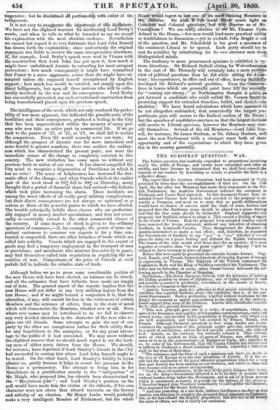Although - before we go to press some Considerable portion of
the new House will have been elected, no balance can be struck, and all the estimates that have hitherto been made are simply out of date. The general aspect of the reports implies that the Myr 'House will not differ in any very striking: degree from the late House ; and if we might hazard a conjecture it id, that -the alteration, if any, will consist far less in the retirement of certain Members and the entrance of others, than in the state of mind which will characterize the Members, whether new or old. Even where new names may be introduced to its we fail to observe any very decided alteration in the character of the.men 'who re- place our old friends. Sonic attempts to gain the seat of one party by the other are conspicubus .rather for their oddity than for any hopefulness in the enterprise, or for any great advan- tage to the public if it had succeeded. We may avow without the slightest reserve that we should much regret to see the- lea& ing men of either party driven from the House. We should, for instance, have regretted if Lord Stanley's friends in the City had succeeded in .seating him where Lord Sohn Ruisell ought to be seated. On the other hand, Lord Stanley's fidelity to Lynn pleases us, pertly because it helps to secure his presence in the House as a permanency. The attempt to bring him in for Marylebone as a gratification merely to the " indignation" of Mr. Haigh, who proposed hini, has already been characteriied as the " Marylebone joke " ; and Lord Stanley's position On the poll would have made him the victim of the ridicule, if his own character were not above that absurd travestie on the licence and activity of an election. Sir Henry Leeke. would probably make a very intelligent Member of Parliament, but the whole House would regret to lose, one of its most amusing Members in Mr. Osborne. Sir Alai 'iti`Na`b could throw much light on Canadian and Colonial ,questions, but why deprive us of Mr. Coningham ? We are radii anxious to-see Mr. Thomas Dyke Adana in the House,—few men would lend more practical utility or truthfulness to discussion,—yet to exclude John Bright is out of the question, and Mr. Scholefield is too good a specimen of the consistent Liberal to be spared. Each party should try to seat its- notables by substituting for its own obscurer men mo=p
distinguished minds. . Hof
The tendency to inore pronounced opinions is exhibited in va- rious directions. Sir Richard Beth_ ell sitting for Wolverhampiii in the seat of Mr. Thornely will certainly take a more pod: view of political questions than he did while sitting fer.lijdisi- bury ; his expeiielides' in office and ont of office, having dOii:-#ddy developed Sir Richard's natural qualities. Even the Conserva- tives in towns 'Which' are generally quiet have d'elf•the riecedtgy for " coming out strong;" as Northampton thought it politiejet put forward a candidate who could outbid Mr. Vernon titinitl4n prbmising support for extended franchise, ballot, and eiuretratl abolition T. We have heard calculations which have appeared to be not altogether unibunded, that numerically the largest pro- portionate gain will. accrue to the Radical section of the House; but the speeches of candidates convince us that the largest increase will accrue to Liberal opinions, hoWever the Members may clas- sify themselves. Several of the old Mentbers,—Lord 'John Ibis- sell, for instance, Sir James Graham, or Mr. Sidney Herbert, will meet the new Parliament with a stronger sense both of their opportunity and of the expectations to which they have given rise in the country generally.


























 Previous page
Previous page